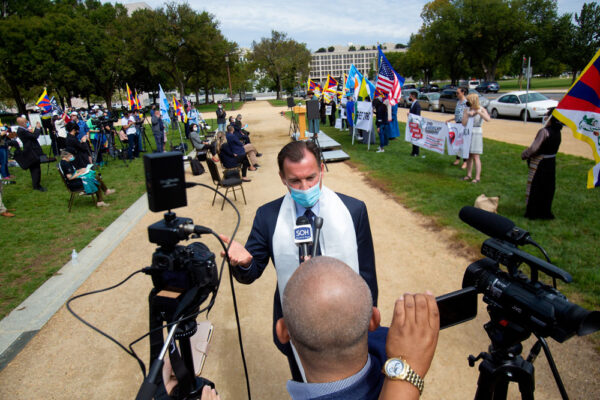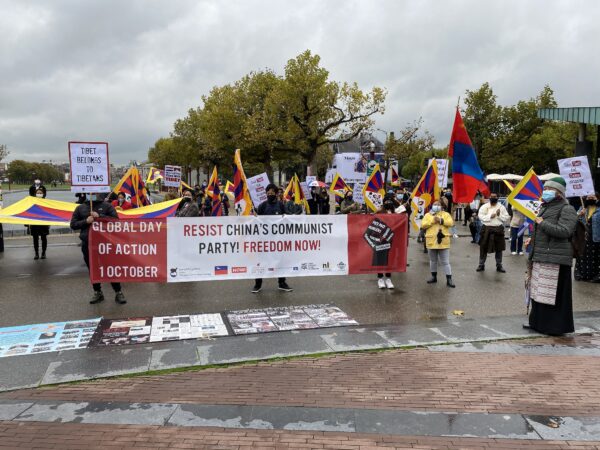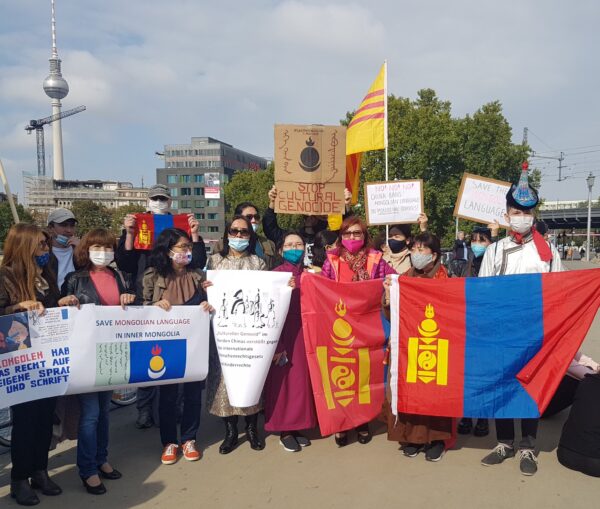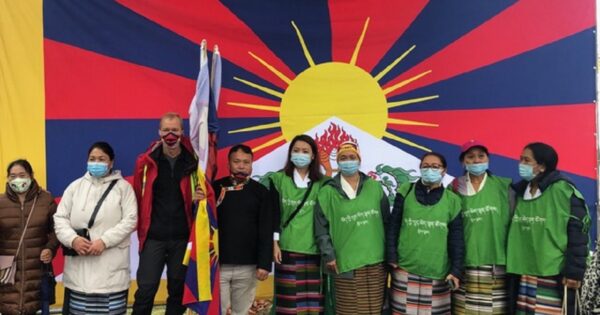On the occasion of the 71st anniversary of the establishment of the People’s Republic of China yesterday, the International Campaign for Tibet joined in a series of protests to denounce the massive human rights violations in China as part of the “Global Day of Action.”
The Global Day of Action was a joint initiative of organizations representing Uyghurs, Tibetans, Southern Mongolians, Hong Kongers and Taiwanese joining hands—either through physical demonstrations or via online action—on China’s National Day to honor the victims of the Chinese Communist Party’s repression and demand that China respect the fundamental rights and freedoms of all peoples.

Rep. Suozzi addresses the rally. (Photo: RFA)
In Brussels, the World Uyghur Congress, the Unrepresented Nations and Peoples Organization, the Belgian Uyghur Association, Lungta – Actief voor Tibet, the Tibetan Community and ICT held a protest in the EU headquarters district, where they were joined by about 150 people, as well as representatives of Hong Kong and Taiwan. The event took place in the margins of the Special European Council meeting where EU leaders discussed foreign affairs issues, including the EU relationship with China (in its conclusions, the European Council “underlines its serious concerns about the human rights situation in China, including developments in Hong Kong and the treatment of people belonging to minorities, as expressed at the EU-China summit in June and the Leaders’ meeting held on 14 September”). The same day, another protest was organized by a number of Tibetan associations in Belgium in front of the Chinese Embassy.

The organizers called in particular on the EU and its member states to urgently adopt a targeted sanctions regime and use it to hold Chinese officials responsible for serious human rights violations accountable, and to carry out a comprehensive impact assessment of the EU-China Investment Agreement currently being negotiated, to determine whether it is capable of safeguarding human rights in China and guaranteeing international peace and security. They also encouraged the EU to establish an efficient regulatory framework ensuring that European companies respect human rights in their activities in China, and to demand unfettered access to East Turkestan and Tibet for EU diplomats and journalists, in order to assess the full extent of human rights violations there.

In Berlin, a rally took place in front of the Chinese embassy. Together with 10 other human rights organizations, ICT used Chinese National Day to protest the human rights violations under the Communist Party rule. Several members of the Bundestag also supported the campaign and spoke at the rally, including Gyde Jensen, chairwoman of the Human Rights Committee, Michael Brand, speaker for human rights policy of CDU/CSU and Peter Heidt, spokesman for human rights policy for the Liberals.

In Amsterdam, a few hundred Tibetans, Hong Kongers, Uyghurs and Mongols demonstrated together on Museumplein. The protesters started by singing the national anthems of Xinjiang and Tibet. Tsering Jampa, director of the International Campaign for Tibet Europe, called for a peaceful solution to Tibet and the closure of training and vocational training camps. Representatives of the Uyghurs called for an end to forced labor in Xinjiang and the closure of camps in which over a million Uyghurs are locked up. Mongols demonstrated for the use of their own language, and Hong Kongers called for the release of prisoners and the reversal of the National Security Law.
It was the first time that so many organizations representing various ethnic groups and peoples in China demonstrated together, indicating their increasing solidarity in the face of the Chinese government’s abuses of the rights and freedoms of their peoples.
In Washington, DC, the Capital Area Tibetan Association and Students for Free Tibet organized a rally by Mongol, Tibetan, Uyghur, Hong Kong and Chinese groups in the United States at the Capitol Reflecting Pool.
Speakers included Reps. Tom Suozzi, D-N.Y., Scott Perry, R-Pa., and Ted Yoho, R-Fla., Rep. of His Holiness the Dalai Lama to North America Ngodup Tsering; Omer Kanat of the World Uyghur Congress; Enghebatu Togochog of the Southern Mongolian Human Rights and Information Center; Dorjee Tseten of SFT; Tenzing Barshee of CATA; Kristina Olney of Victims of Communism; and Jeffrey Ngo of Washingtonians for Hong Kong.

